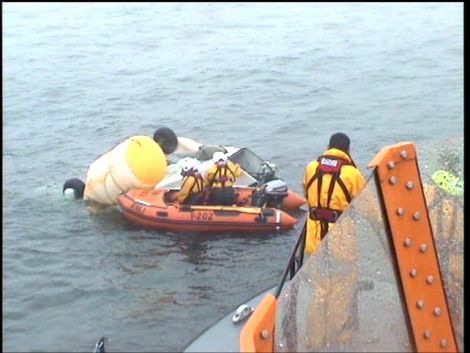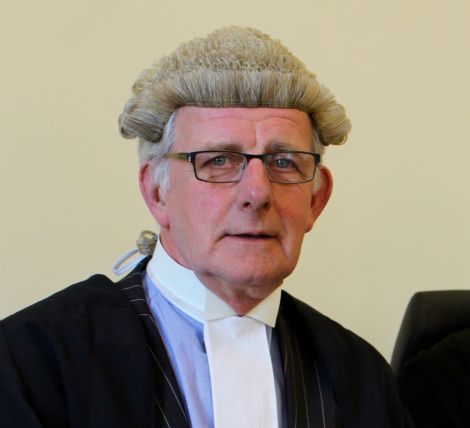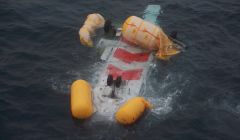Court / Sumburgh helicopter crash caused by pilot error, inquiry finds
THE SHERIFF leading an inquiry in the fatal helicopter crash off Sumburgh in 2013 has conceded it is “impossible to come to any definite conclusions in a comprehensive way” about what happened in the lead-up to the accident and why.
Sheriff Derek Pyle, however, confirmed that the accident – which claimed the lives of four offshore workers – was caused by the flight crew not effectively monitoring the helicopter’s flight instruments.
In a fatal accident inquiry ruling published on Monday (19 October), Sheriff Pyle said: “This was a dreadful accident with long term repercussions for the survivors and the families of the deceased which no determination by this court can properly describe.
“I do hope that it has at least assisted in an understanding of what occurred, the reasons for it and what has been done to ensure so far as practicable that such an accident does not occur again.”
Sarah Darnley, 45, of Elgin, Duncan Munro, 46, from Bishop Auckland and George Allison, 57, of Winchester, drowned after the helicopter hit the sea 1.7 miles from Sumburgh.
Fifty nine year old Gary McCrossan, from Inverness, died from heart failure following the crash.
One survivor, Sam Bull, took his own life four years later aged 28 after suffering post-traumatic stress disorder.
Sheriff Pyle said “my condolences go, in particular, to the families of the deceased, including – lest it be forgotten – the family of Mr Bull”.
A total of 16 passengers and two crew were on board the AS332 L2 Super Puma as it approached Sumburgh Airport in poor weather on 23 August 2013.
Become a member of Shetland News
Pyle said the approach was proceeding “satisfactorily until the helicopter reached 1,000 ft above the mean sea level, when its flight path deviated from the planned vertical profile”.
The speed of the helicopter fell and it ultimately hit the sea. It overturned but floatation devices saved it from sinking.
“At the end of the day we know that for whatever reason or reasons the commander failed to maintain the target approach speed of 80 kts,” Sheriff Pyle said.
“If he had done so, the helicopter would not have reached the critically low energy state from which recovery was impossible.”
The sheriff’s report said that the helicopter’s commander Captain Miglans, who had worked in the North Sea for 16 years, “could not remember anything about the flight from between seven and five miles out from Sumburgh until seconds before the crash”.
Co-pilot Alan Bell was considered by a medical expert to be unfit to give evidence in the inquiry.
Neither Miglans nor Bell have flown a helicopter since.
Sheriff Pyle also noted in his report that there is “emerging evidence […] that the human brain has inherent difficulties in effectively monitoring aircraft instruments, particularly when automation, such as auto pilot, is engaged, albeit that in only very exceptional cases and circumstances might these difficulties have fatal consequence”.
He added that there was “plainly no wilful neglect” from the two pilots in the incident.
“Rather, there was, as one witness described it, a perfect storm of circumstances which resulted in all the safety barriers in place not preventing – or remedying – his one failure, to maintain the correct speed,” Sheriff Pyle said.
The sheriff had previously criticised the delay in a fatal accident inquiry taking place after receiving an explanation he said there were a number of reasons for this.
Sheriff Pyle said the “principal difficulty” for the Crown when performing criminal investigation of air accidents is that the UK Government’s Air Accidents Investigation Branch takes control of the investigation of the circumstances of the crash.
He said the court process around the Crown trying to gain access to the cockpit voice recorder took 18 months.
Space2face

Space2face Shetland is an independent and confidential service which uses Restorative Justice and the arts to bring those harmed by crime or conflict and those responsible for the harm into communication. We enable everyone affected by a particular incident to play a part in repairing the harm and finding a positive way forward.
If you would like to reach out to us, please contact us via e-mail info@space2face.org or mobile 07564 832467.
If you would like to know more, visit our website www.space2face.org, or our Facebook page #space2faceshetland.
The project is also currently fundraising to secure office space in Shetland’s brand-new creativity and wellness centre, The Mission. If you’re interested in getting involved, or making a donation, head over to www.space2face.org/how-you-can-help


































































